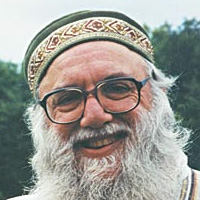
Rabbi Arthur Waskow is the director of The Shalom Center. In 2013, Rabbi Waskow received T’ruah’s first Lifetime Achievement Award as a “Human Rights Hero.” His chapter, “Jewish Environmental Ethics: Adam and Adamah,” appears in Oxford Handbook of Jewish Ethics and Morality (Dorff & Crane, eds.; Oxford Univ. Press, 2013). Rabbi Waskow is the author of 22 books including Godwrestling, Seasons of Our Joy (JPS, 2012), and Down-to-Earth Judaism: Food, Money, Sex, and the Rest of Life. With Sister Joan Chittister and Murshid Saadi Shakur Chisht he co-authored The Tent of Abraham: Stories of Hope and Peace for Jews, Christians, and Muslims, and with with Rabbi Phyllis Berman wrote Freedom Journeys: Exodus & Wilderness Across Millennia (Jewish Lts, 2011). He edited Torah of the Earth (two volumes, eco-Jewish thought from earliest Torah to our own generation). These pioneering books on eco-Judaism are available at discount from “Shouk Shalom,” The Shalom center's online bookstore.
Filter resources by Category
Filter resources by Tag
Filter resources by Collaborator Name
Filter resources by Language
Filter resources by Date Range
Contributed by:
Arthur Waskow, the Shalom Center
Jews use the Kaddish to mourn the dead, though it has in it only one word — “nechamata,” consolations – which hints at mourning. And this word itself is used in a puzzling way, once we look at it with care. As we will see below, it may be especially appropriate in time of war. The interpretive English translation below may also be appropriate for prayers of mourning and hope in wartime by other spiritual and religious communities. In this version, changes in the traditional last line of the Hebrew text specifically include not only peace for the people Israel (as in the traditional version) but also for the children of Abraham and Hagar through Ishmael (Arabs and Muslims) and for all the life-forms who dwell upon this planet. . . .

